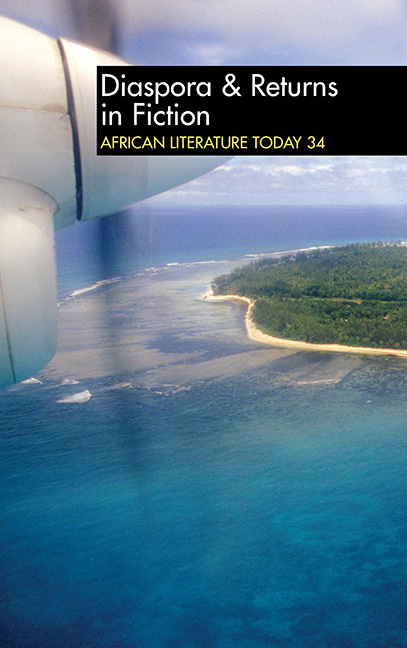Book contents
- Frontmatter
- Contents
- Notes on Contributors
- EDITORIAL ARTICLE
- FEATURED ARTICLES
- LITERARY SUPPLEMENT
- 4 Poems by Tsitsi Ella Jaji
- REVIEWS
- Eds Xavier Garnier & Pierre Halen, Littératures africaines et paysage
- Mukoma wa Ngugi, Mrs. Shaw (A Novel)
- Elleke Boehmer, The Shouting in the Dark
- Ernest Emenyonu, Princess Mmaeyen and Other Stories
Eds Xavier Garnier & Pierre Halen, Littératures africaines et paysage
from REVIEWS
Published online by Cambridge University Press: 08 April 2017
- Frontmatter
- Contents
- Notes on Contributors
- EDITORIAL ARTICLE
- FEATURED ARTICLES
- LITERARY SUPPLEMENT
- 4 Poems by Tsitsi Ella Jaji
- REVIEWS
- Eds Xavier Garnier & Pierre Halen, Littératures africaines et paysage
- Mukoma wa Ngugi, Mrs. Shaw (A Novel)
- Elleke Boehmer, The Shouting in the Dark
- Ernest Emenyonu, Princess Mmaeyen and Other Stories
Summary
This rich volume brings together nine contributions on the landscape in African literature, considering novels covering parts of the African continent from Senegal to South Africa, in order to examine the relevance of the concept of landscape to the study of African literatures. The volume first surveys the treatment of landscapes in European history from the Renaissance to the Romantic period, alluding to a Western memory bank, a kind of literary and artistic baggage. It reveals the gulf between this European literary and artistic construction and reading of landscapes, informed by Renaissance models, and the African perspective, and shows how inadequate the European reading grid is in its approach of African landscapes, as evidenced by colonial literature. The authors take readers through various types of landscapes, either seen from above or fragmented pictures, highlighting the difference of treatment between African and European approaches, before summarising the listed approaches and considering the place of landscape in the various cultures. This is convincingly illustrated in Malanda's contribution on imaginary Edenic landscapes in children's literature – a study of three books published in the 2000s and presenting a colonial type of rapport between humans and animals – echoing the colonial past in their portrayal of heroes protecting wild animals in Eastern Africa. While the author denounces both colonisation and the destruction of nature, her text confirms the huge difference between the African and European perception of landscape. Savannah is presented here as a wild animal habitat, where humans are not welcome, and its destruction as a crime. Natural reserves and animal parks are described as a reparation, restoring the precolonial past, while they were actually initiated by colonials, which makes these novels a product of the colonial enterprise.
While the texts from the colonial period offer visual descriptions of landscapes, influenced by European traditions, Samin's study of the Karoo landscape in South African literature, a beautiful reflection highlighting the writers’ desire to penetrate the landscape and identify with it, vividly exposes the challenge posed by these landscapes to Afrikaners. It illustrates these writers’ search for a language to adequately recreate the Karoo landscape and the failure of their texts to conjure anything but an empty, utterly alien, unknown and wild space.
- Type
- Chapter
- Information
- ALT 34 Diaspora & Returns in FictionAfrican Literature Today, pp. 231 - 233Publisher: Boydell & BrewerPrint publication year: 2016

